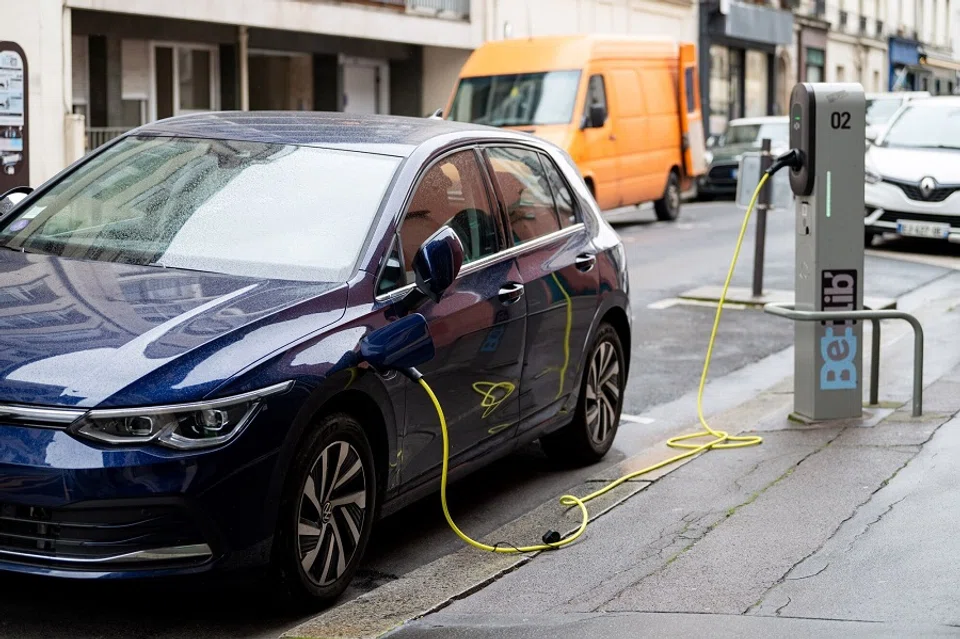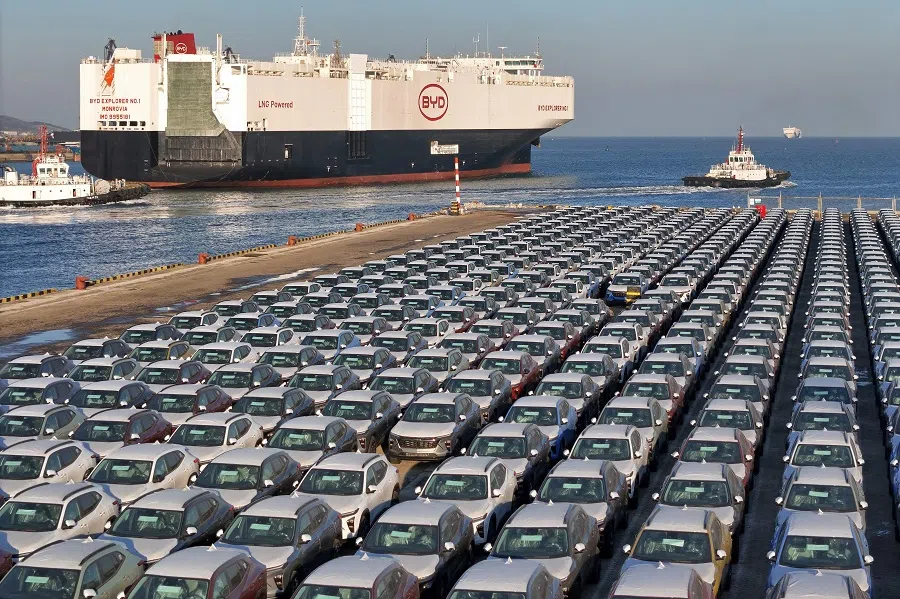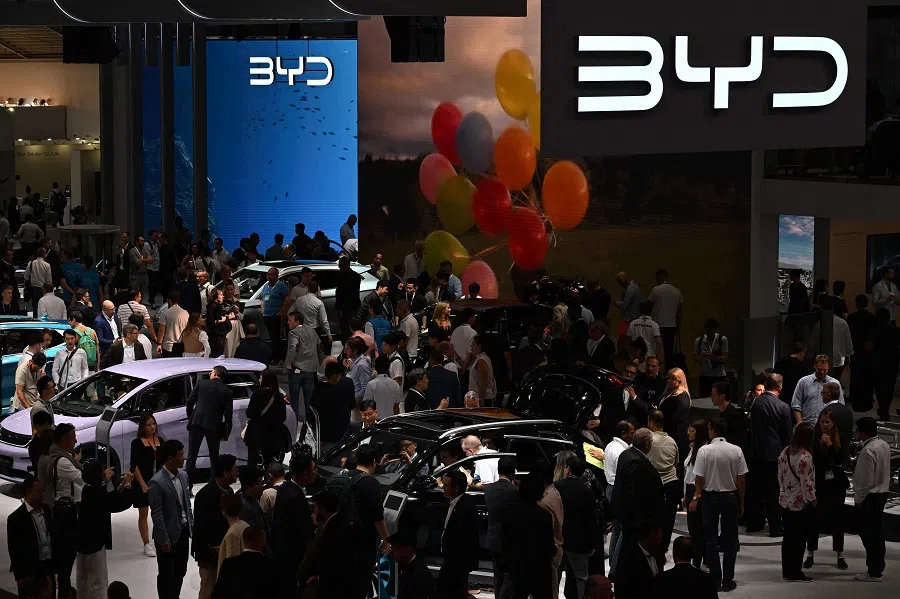How German automakers maintain their edge over Chinese EV brands
German academic Helena Wisbert analyses how strong European consumer appetites are for electric cars, in particular as new entrants from China and the US seek to get a slice of the pie. She asks: have competitors, who have equipped their vehicles with numerous digital features, AI-supported voice control and a variety of third-party applications, misunderstood the German market?

The market for electric cars is evolving dynamically not only in China, the largest market for new energy vehicles, but also in the European Union. In 2023, the market share of pure electric cars rose to 14.6%, while that of plug-in hybrid vehicles went up to 7.7%.
The European market, driven by stringent CO2 fleet limits until 2035, is poised to be a future stronghold for electric vehicles (EVs). New entrants from China and the US aim to capitalise on this planning certainty, pursuing an expansion strategy into Europe.
Decelerating growth rates intensify competitive pressure
However, EV growth rates in Europe have recently slowed down, showing a 16.9% decrease in December 2023 compared to the same month the previous year. The most significant decline was evident in Germany, the largest European individual market, with a 47.6% reduction in fully electric car sales compared to December 2022, while the entire automotive market experienced a decline of 23%. Preferences shifted back towards gasoline vehicles, especially as EVs remain up to 25% more expensive than comparable combustion engine vehicles in Germany.
Additionally, the state-supported environmental bonus of up to €6,750 (US$7303.67), available to commercial and private customers, expired in September and December respectively. Many customers are now adopting a wait-and-see approach, observing how prices and the EV market evolve. A considerable portion of customers remains sceptical about whether an EV suits their driving habits; their considerations are exacerbated by the higher overall cost.
The first EV customers, who were convinced of the technology's future viability, have already acquired EVs in recent years. The challenge now is to penetrate larger market segments, such as the lower compact car segment or small car segment. The hesitation is further fuelled by the slow progress in expanding public charging stations.
With an increasing number of offerings in the market, EV prices are expected to trend towards combustion engine vehicles.
The prematurely expired environmental bonus was factored into the sales planning for 2024 by automakers. Consequently, many car makers are now attempting to compensate for the discontinued bonus with discounts and price reductions. The price pressure is intensified by new entrants aiming to swiftly gain market share in Germany by reducing prices. In some cases, the offered discounts are even higher than the originally granted environmental bonus. With an increasing number of offerings in the market, EV prices are expected to trend towards combustion engine vehicles.

The expansion of capacities by new automakers is altering price structures, impacting profitability. The growth strategy of companies like Tesla and the entry of new competitors from China, such as BYD, are intensifying competitive pressures on local providers.
According to a study conducted at the Ostfalia University in Wolfsburg, new Chinese brands are particularly associated with a more attractive price-performance ratio than well-known local brands. New competitors are entering the market with attractive leasing rates, which is especially popular in Germany. In this set-up, the car is returned to the auto bank after a certain mileage and contract duration; customers benefit from predictable monthly rates.
The dominance of the traditional: quality, reliability and driving comfort
In the world of automobiles, a transformation has taken place in Germany in recent years, increasingly turning the vehicle into an expanded personal space. Digitisation is redefining the driving experience, but traditional quality features remain important.
According to another recent study from Ostfalia University, traditional quality features like high quality, reliability, and driving comfort still top the list of customer expectations in Germany. Even among EV buyers, where a stronger affinity for digital features might be expected, traditional quality features remain of paramount importance. These attributes are commonly associated with established German automakers like VW, BMW or Mercedes.
Thus, the question arises: have competitors, who have equipped their vehicles with numerous digital features, AI-supported voice control and a variety of third-party applications, misunderstood the German market? The appearance is deceptive.
The significance of infotainment systems goes hand in hand with the development of driver assistance systems towards autonomous driving.
The challenge lies in anticipating the added value of innovative features that create entirely new usage situations and experiences. In the past, German manufacturers focused on traditional performance characteristics such as high-quality craftsmanship, driving comfort and performance. With EVs, connectivity now becomes a more significant criterion, one that new competitors have concentrated on, offering attractive infotainment systems.

Chinese automakers have outfitted their vehicles with a higher level of equipment in terms of infotainment, according to surveys. The significance of infotainment systems goes hand in hand with the development of driver assistance systems towards autonomous driving.
If drivers must focus on navigating through slow-moving traffic and only the passengers get to enjoy the full streaming offering, they might not be all that excited; but things would be different if drivers could divert their attention from the road to smartphones and emails for an extended period. And this situation is already a reality.
Mercedes and BMW have introduced Level 3 autonomous driving for special driving situations in Germany, where drivers explicitly do not need to pay attention to traffic, as the vehicle takes control, including liability. In this situation, digital features such as video call systems and e-commerce apps take on an entirely new significance.
German automakers leverage established brand value and customer loyalty
Many customers associate a certain lifestyle and image with German automotive brands. The Volkswagen Golf, in particular, stood for an entire generation in Germany, known as "Generation Golf". German automakers leverage their high level of recognition and brand value in electric cars, differentiating themselves from new EV brands that lack a long history.
While awareness will likely increase, currently 50% of people in Germany cannot name a Chinese automotive brand. However, 35% of respondents would consider a new Chinese brand when purchasing an EV. For German customers, durability plays a significant role, prompting them to wait and see how new models prove themselves over time.
... automakers still generating a large share of their revenue from combustion engine models have an advantage.
German carmakers are firmly established in the combustion engine models. The EV market in Europe is subject to significant regional fluctuations and heavily dependent on state support measures. The expiration of the environmental bonus in Germany, compared to other European markets maintaining support, such as France, has shown the importance of subsidies for the uptake of electromobility in Europe. Therefore, automakers still generating a large share of their revenue from combustion engine models have an advantage.
Those focusing on classic models that can be sold at stable prices find it easier to navigate the current downward spiral in electric car prices. In the battle for market share, it will be revealed who has the endurance in the dynamic development of the electric car market and can sustain price reductions over an extended period.





![[Big read] When the Arctic opens, what happens to Singapore?](https://cassette.sphdigital.com.sg/image/thinkchina/da65edebca34645c711c55e83e9877109b3c53847ebb1305573974651df1d13a)